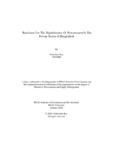| dc.description.abstract | Earlier, procurement was just a small support function catering to an organization's direct and
indirect buying needs. However, over the last few years, it has transitioned into an integral part
of an organization, with the contributions gaining more interest and importance. Companies
are competing against one another and investing increasingly in technology enablers to adapt
the best practices of procurement and stay ahead in the market. Digitalization is the new buzz
word, and it is identified as a critical success factor in winning in today's competitive market.
It promises to create an interconnected and transparent ecosystem amongst firms, suppliers,
and customers with benefits in traceability, better decision making, efficiency, risk
management, accuracy, speed, and end-to-end integration, among others.
After studying several papers, it was identified that globally, Artificial intelligence, Internet of
things, and Robot process automation are the leading technologies in the future of procurement.
A similar study was replicated for the private sector of Bangladesh to understand if Bangladesh
is ready for the technological wave through a survey conducted on procurement professionals,
with 40% of them having over 8 years of experience. Although the digital revolution is at an
early stage, advents such as Blockchain is already in place. Applications in the fields of AI,
Robotics, and 3D Printing are believed to come in the longer term.
There are opportunities to identify and prioritize capability building as a lever for adapting
technological advancement. Moreover, as the literature suggests, the applications of
Digitalization are beyond using the ERP solution, e-sourcing, e-auction, catalog buying and
data analytics, which are some of the current practices in the country. Hence, it is of great
importance that the management has a vision for the Digitalization, keep up with the upcoming
trends from developing countries and go ahead in implementing them in their respective
organizations. | en_US |

